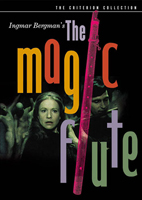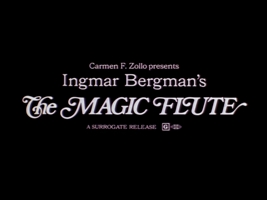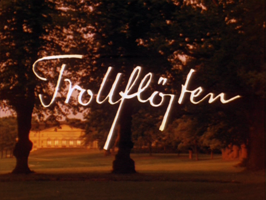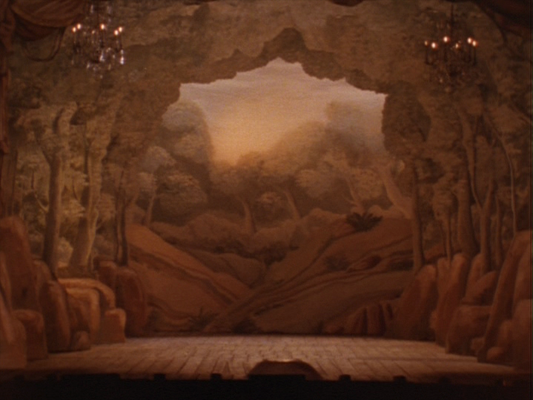2000: 


adapted and directed by Ingmar Bergman
original libretto by Emanuel Schikaneder (1791)
original Swedish translation by Alf Henrikson (1968)
Criterion #71: The Magic Flute. (Or is it Ingmar Bergman’s The Magic Flute?)
Do we know for sure that in 1791, a popular-style opera like this (a “singspiel”) was meant to be sung prettily? I think the thing about opera that’s always confused me is that it’s so fixed on being pretty, even when nothing about the material seems to call for it. As a kid I couldn’t make head or tail of operas because I couldn’t hear them through the singing, which seemed always to be spoiled by this strange foreign element, this obsession with “beauty.” Is it possible that our ideas about what constitutes prettiness are more recent and anachronistic than we realize? That even in reading 150-year-old descriptions of “bel canto” singing, we are misinterpreting them according to our modern-day sensual enculturation? (So to speak?)
Maybe doing The Magic Flute brashly in the style of a present-day musical would be anachronistic, but better an anachronism that conforms to our living intuitions than a 19th-century anachronism maintained artificially.
Why can’t people ever do operas completely without pretension? I feel a hunger for productions of opera that treat it as naively as our high school production of Oklahoma: simply as instructions for a show that is guaranteed to work as it was designed to work. Community theater is sort of like the Wile E. Coyote approach to art, where you order the box from the ACME Corporation and then set it up according to the instructions, and press the red button and bingo, one satisfied audience. All the important artistic calculations have been made for you! Foolproof! Just add water!
So I don’t really understand why equivalently low-rent opera productions are so insistent on bringing the beauty and the glory. I guess it’s just that the skill involved self-selects people with a more intrusive ego agenda; a dentist and a librarian can get through “The Farmer and the Cowman” without ever having to think about breath control and their larynxes (larynges?), but who at the bake sale is going to sing Der Hölle Rache?
This movie makes me sleepy, which I’ve come to think reflects well on a piece of art. It’s not a movie’s responsibility to keep me awake; it’s up to me to not be sleepy, as a matter of course. If a movie reveals my sleepiness to me, that means it has relaxed me, which means that in some way it feels true and right. To fall asleep to something is to have found harmony with it.
I thought I’d seen this DVD many times already — I was given it as a gift maybe 14 years ago — so I folded laundry while I watched… but I came to realize that every time I’d watched it, I must have gone into a trance. I realized this because I found I’d gone into the trance again, and when I looked up, what was onscreen was completely unfamiliar to me. It turned out there were sections of the movie I had truly never before paid attention to. So I had to watch it twice, which delayed this entry for a while.
At my last go-round with Ingmar Bergman, I said that to be watching one of his movies is to be surrounded by feelings, and how wonderful a condition that is, regardless of what you think critically. It’s in fact the most luxurious possible situation from which to take issue with the work of art that makes it possible. And that’s my review of this one too: I am not in love with the movie, but I am genuinely grateful for the place from which I find myself not loving it.
My feelings are very very mixed. I have so many different ways of taking this movie! Like a lot of art, it makes many different possible attitudes available to me! I aspire to choose the rewarding ones and release my grip on the frustrated ones… but it’s very hard! I have such a strong intuition that frustrations can be shaken into submission and spun into gold. And won’t that have been worthwhile? In my whole life of critical crankiness, my complaints have always felt to me, in the moment, like a symptom of my having such gleamingly good intentions: “I so diligently tried to spin it into gold, but this damn straw just refuses to spin properly, so naturally I’m going to call it out!”
But of course that’s a very clouded idea of what constitutes “good intentions.” Straw after all is just straw, and there’s nothing wrong with it. There’s always going to be straw in the world; straw has its place. So, yes, I’m trying to learn not to be obsessed with it, as best I can.
Right now, “as best I can” is only okay. So here come a lot of excruciatingly nuanced complaints.
The seed of the film seems to be that Ingmar Bergman had a formative aesthetic experience seeing The Magic Flute as a child, and this project is as much about his memory of that experience as it is about the opera itself. It is all seen through the eyes of a child.
Though Bergman puts a little girl’s face on the screen repeatedly as though she’s the audience, little Ingmar is the real audience, and his outlook is psychologically particular. This is a child who experiences a great warm sense of wonder, but also one to whom nothing is given directly. In his mind, the opera production is decidedly not for him; it is mysterious and it is his privilege to see it. This goes without saying; this is the emotional ground of the movie. Being silently present near where the grown-ups are going about their business, and observing it raptly, is the natural mode of relation.
As material, The Magic Flute suits this outlook nicely because it already doesn’t make sense to anyone, adult or child alike. Mozart and his Masonic collaborators, writing a secret members-only allegory, treated their audience like children watching from the stairs. So Bergman’s childhood experience of The Magic Flute was probably that here was a work that captured the true existential condition.
For my part, I always identified more with the framework of Alice in Wonderland, who is also a polite observer in a world that runs according to its own bewildering rules… and yet at the same time tacitly understands that, despite the show of indifference and exclusion, it is in some obscure way all staged for her. Her journey of encounters with people who just barely have time or sanity to spare is the journey for which the world exists. The mysteries around her are not wondrous adult realities for her to meekly admire and hope someday to earn entrée into; they are just absurd vanities through which she can see immediately. Jam tomorrow, jam yesterday, but never jam today. It’s she who is humoring them, whether or not they know it. And sure enough, at the end of each book, there’s a kind of existential concession: it is all about her; she’s on trial, or she’s being toasted as the new queen. Yes, the grown-ups are still monstrously unpredictable and not managing proper eye contact, but they are admitting to her full personhood, in their way. (Also cf. The Wizard of Oz).
Whereas The Magic Flute is all about the process of kneeling before mysteries, earning induction into the benevolent esoteric order of the temple. This is the construction Ingmar believes in. He feels it as fundamental. It is the source of all goodness. He is dependent on it to tuck him in at night. In fact, in the movie he alters the opera to turn it explicitly into a mommy vs. daddy story, in case we don’t get it.
Like so many opera productions tend to do, this movie takes the opera as preexisting — not just the ACME kit, but the living performance itself: it’s known, it’s a given. It doesn’t actually need to be “done” in the simple community theater sense, because it’s already been “done” for all eternity. Rather, it’s being “visited,” “enjoyed” as an institution. The moment when the audience takes it in for the first time is elided.
There’s plenty of love for the idea of a first time, but there’s no proper first time. No direct offering, only the implicit, indirect one. This is young Ingmar’s sense of what makes the opera great: adults already know it, and he doesn’t. He will goggle in timid wonderment.
At intermission, Bergman shows us the actors backstage, out of character, smoking, playing chess — but all still charmed, weightless. We’re not being shown reality, we’re being shown “actors” and “dressing rooms” as another layer of the child’s imagination: the soft impression that backstage these actors were maybe partially still their characters, too. I can remember having such an impression. But like so much of what’s at stake here, the real impression wasn’t something that could ever be pictured. By staging it here, Bergman does not offer it to me again; he only refers to it.
I’m aware of Bergman’s project and can recognize myself in it, which is appealing. But that recognition is dependent on my conscious maturity; it’s quite a different thing from feeling a natural affinity of the sort he felt as a child. Had I seen this movie when I was young, I think I would have been struck by its peculiar evasion and underplaying of the show itself; to what end, I would not have been able to make out. And if the idea is ostensibly to honor the spiritual life of the child, then I want to honor that part of my response. I shouldn’t have to recognize nostalgia rationally to feel the underlying order of a work of art.
I guess I’ve become exceedingly touchy about nostalgia, and it’s because sentiment that’s very important to me often gets packed away inside it, like a hard shell. I want one without the other, but separating the two is difficult and requires a new kind of attention from me. This movie contains, closely linked, the true sentiments associated with watching a work of art like The Magic Flute, and also retrospective conceptualization of those sentiments. Explicitly pointing the camera at so much “quaintness” and “charm” is a kind of schematic imposition of something that in its authentic form was subconsciously felt rather than consciously observed. The truer artistic path would have been merely to create that same impression on us now. We as an audience are just as capable of pure feeling as young Ingmar was!
The mistake that Bergman makes is thinking that he deepens his art by not simply being the grown-up who provides it for the child, but being the grown-up who wistfully is aware of everything. In fact, that awareness only weakens the trance he wants to recreate. “You are getting sleepy… You are getting sleepy… Feels weird, doesn’t it? I know, right?… You are getting sleepy…”
My overarching reservation about Ingmar Bergman is that he wants us to be aware of how much he feels. But this is exactly what a child doesn’t care about from an adult, and frankly what an audience doesn’t care about from an artist. Wanting us to feel what you feel is one thing; he also wants us to feel that he feels.
Of course, it’s a fine line. It really comes down to where I and my mind are, when I’m watching. If everything in the movie just happens to correspond exactly to that moment of my inner life, I would in that moment just see Bergman as a great soul-friend.
But art doesn’t have to be so contingent, to just sit waiting for the magic sympathy to come around. It can be seductive; it can be manipulative in the best sense. To do that, the artist has to just go about his work and ply his chosen craft; he can’t be looking for anything other than the satisfaction it gives. I may be wrong but I get the sense Ingmar Bergman always wanted something from his audience; his huge artistic generosity was the prelude to the eventual ask. Of course, he could never get there in reality, but psychologically I feel it lurking.
Maybe that’s just because I know the feeling.
Mozart surely knew exactly what he was doing, and surely hit on exactly the spirit he intended for every number. So when narrative moments of tension or mystery or horror are accompanied by blithe major-mode twiddling, it must indicate an 18th-century distance from the characters and their travails. When the music sounds like this, the audience is surely not expected to feel the dramatic situation in our modern way. Rather, they’re expected principally to feel the real situation: “we are being told a charming story and shown a charming show.” In such a culture, emotional immersion is a special effect, used sparingly. For the most part, it’s just a play, and that’s a good thing!
In Bergman’s version, this distance exists, but only at the private psychological level discussed above. He does not seem to see that the sweet inconsequentiality he brings to so much of the action isn’t just his personal avuncular wink from behind the curtain. His direction often seems to be telling us that “officially,” the movie is emotionally invested in the story, even when the music has already belied such investment. Bergman acts as though he and Mozart are in cahoots under the grown-ups’ table that is the opera. But the music is the opera. The “official” version does not exist.
By the way, as for The Magic Flute itself: I’m pretty sure the big Masonic secret, and the reason for all the hermetic rigmarole, was atheism. The outer trappings of Freemasonry are a kind of vague, mystified, sentimental humanism, to test the waters. But after sufficient grooming and ceremony and loyalty oaths and haunted housery, if you were deemed trustworthy, you’d be brought into the circle of trust and they’d tell you outright: yeah, there’s no god, there’s just mankind, and we have to do our best.
Just a hunch.
The weirdness of The Magic Flute, it seems clear to me, is a straightforward Masonic allegory: the Queen of the Night is the church. We begin believing she’s our mother and our protectress, but then we grow up and find out that she’s actually a cruel and jealous tyrant, and that can be a rough transition for all involved. But if we can pass through the silence and the darkness and the fire, guided by our magic flute of art and love, and our jingling bells of childlike purity, secular humanism can and will win the day, huzzah! And even simpletons like Papageno will benefit because they don’t actually care about religion as much as they say; they really just want girlfriends. They’ll go along gladly into the glorious new world.
But as a “charming fairy-tale opera,” it’s all messed up. In a fairy tale, if you come across the strange temple of an unknown cult, the story itself does not join the cult, obviously! Here we start in generic fairy-tale space and journey toward this cult, and then, surprise!, the premises of the story go inside the cult’s belief system, without ever actually selling the value of doing so to the audience.
Since the opera is already confusingly half-allegorical, Bergman’s softening, nostalgifying technique just turns it all into a kind of soup. Two hours of pleasant soup, shot with amber love by Sven Nykvist.
There is a part of this movie that for all my mixed feelings never fails to move me, and that’s in the gentle touch of sexiness that Bergman brings to the Pa-pa-pa-pa-pa-Papagena duet at the end. At this one moment in the film I feel that Bergman’s spirit is exactly in harmony with Mozart’s, and it lifts me.
But then I think: Ingmar Bergman, with this vision of romantic joy bubbling inside him, married and cheated and divorced so many times. No images are objective. They all come from people.
Art does not connect us to the eternal; it connects us to the eternal as perceived and conveyed by others. For those of us with social hangups, sometimes it can feel like we need that permission before we can venture there ourselves. But it’s good to keep in mind that as long as it’s someone else’s creation, it’s someone else’s glasses we’re looking through. Seeing it for ourselves can only be done by ourselves, and there’s no telling what it will be for us until we see it.
One of my notes, as taken on my iPhone:
“Sarastro is Ms. cast. How does this thing know Sarot stroke but not miss cast?”
Connection to the previous movie: someone sits in the dark and is tempted by apparitions.
There are no bonus features on the disc! That was easy. Here instead is a picture of Papageno and Papagena in 2012.
Music time. The score is apparently by one Johannes Chrysostomus Wolfgangus Theophilus Mozart, who was a prolific film composer also known for his work on The King’s Speech (2010), The Shawshank Redemption (1994), Sherlock Holmes: A Game of Shadows (2011), and Batman Begins (2005). Obviously our musical selection is going to be the Overture, all 8 minutes of it. Conducted by Eric Ericson. While you’re listening to this, I guess you should imagine a lot of close-ups of people’s faces.
Oh right, I had things I was going to say about that sequence, too. But this has gone on long enough.
